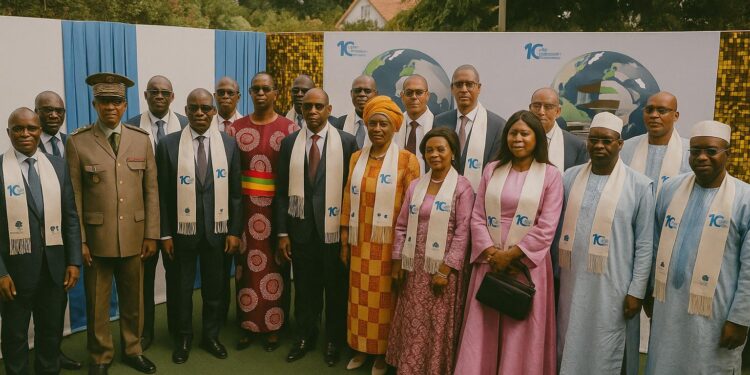Pointe-Noire as a Strategic Maritime Crossroads
The oil-rich Atlantic port of Pointe-Noire rarely lacks for geopolitical symbolism. Its deep-water berths, carved out during the colonial era, have evolved into a coveted logistics interface between landlocked Sahelian economies and blue-water shipping lanes. By hosting the 10th African Shippers’ Days from 14 to 16 July, the Republic of the Congo sought not only to celebrate a decade of continental coordination but also to underscore its determination to convert maritime geography into diplomatic capital.
The presence of Minister Ingrid Olga Ghislaine Ebouka Babackas alongside twenty ministerial-level delegations delivered a clear message: Brazzaville aspires to mediate between coastal export corridors and inland demand centres. The event’s timing proved auspicious. Freight markets remain volatile after pandemic disruptions, while the African Continental Free Trade Area (AfCFTA) moves from ratification to operationalisation. According to UNCTAD’s 2023 Maritime Transport Review, African freight costs still average 15 percent above the global mean, a gap the Pointe-Noire meeting was keen to narrow (UNCTAD 2023).
Debating Freight Tariffs in a Volatile Market
Behind closed doors, negotiators wrestled with surcharges that routinely erode commodity margins. Delegates from Nigeria and Senegal voiced particular concern over so-called “green” premiums levied by major carriers to offset upcoming EU emissions rules. Experts from the International Chamber of Commerce recalled that, without transparent benchmarks, ecological surcharges risk morphing into disguised protectionism. Participants therefore urged the Union of African Shippers’ Councils (UCCA) to establish a continental observatory capable of tracking environmental cost pass-throughs in real time.
In parallel, the Congolese delegation advocated for a calibrated incentives regime to encourage carriers to deploy newer, cleaner tonnage on West-Central African loops. Such a stance resonates with Brazzaville’s National Development Plan 2022-2026, which places sustainable transport at the heart of diversification efforts. The final communiqué stops short of imposing caps on freight rates, yet it exhorts national councils to mobilise data analytics and joint bargaining to curb excessive mark-ups.
Digitalisation and AI Enter the Cargo Space
Another recurring theme was the untapped potential of digital and artificial intelligence solutions. The pandemic accelerated electronic bills of lading and blockchain-based cargo tracking, but adoption remains uneven. Speakers from Angola’s Port of Lobito and Togo’s Lomé Container Terminal demonstrated pilot projects where predictive algorithms reduced vessel dwell times by up to 12 hours. Such gains, though modest, translate into millions of dollars saved across supply chains (African Ports Review 2024).
Congo’s own Port Authority announced a forthcoming data lake designed to interface seamlessly with customs single windows across Central Africa. The system, financed through a public-private partnership with regional banks, is expected to launch in 2025. By committing to shared standards early, Pointe-Noire positions itself as an interoperable node rather than a digital enclave, thereby reinforcing the AfCFTA’s ambition of a truly integrated market.
Corridor Diplomacy and the AfCFTA Imperative
Much of the debate gravitated toward physical corridors linking ports to hinterlands. The Niger-Benin railway stalemate, the Bamako-Dakar highway upgrades and the Kribi-Bangui pipeline proposals featured prominently. Observers from the AfCFTA Secretariat reminded the meeting that the Agreement’s rules of origin will unlock little value if customs bottlenecks and informal checkpoints persist along these arteries. Thus, delegates concurred that infrastructure diplomacy must advance in tandem with tariff liberalisation.
The Pointe-Noire communiqué explicitly calls on member states to harmonise axle-load standards, modernise weigh stations and, crucially, ratify the Rotterdam Rules on multimodal liability. By embracing those provisions, African shippers would edge closer to global best practice, boosting investor confidence without surrendering regulatory autonomy. Sources within the Economic Commission for Africa suggest that adopting uniform liability regimes could shave up to 6 percent off corridor logistics costs by 2030 (ECA Policy Brief 2023).
A Quiet Nod to Regulatory Harmonisation
While technical, the legal component of the recommendations may prove transformative. The UCCA pledged to shepherd national councils through the intricacies of Incoterms 2020, commercial arbitration procedures and standby letters of guarantee. Senegal’s Ndeye Rokhaya Thiam, current UCCA chair, argued that legal literacy forms the backbone of competitive trade. Her assertion echoed World Bank findings that contractual opacity can inflate transaction costs by double digits for small exporters.
Brazzaville’s facilitative posture surfaced again as Dominique Candide Fabrice Koumou Boulas, head of the Congolese Shippers Council, promised a ‘Maison Transport’ think tank to institutionalise such capacity-building. By rooting reform in a bricks-and-mortar centre, Congo signals a preference for tangible deliverables over abstract pledges, a stance welcomed by landlocked participants like Mali and Chad.
Consolidating a Central African Transport Hub
As the roll-up banners came down, the Pointe-Noire gathering delivered more than ceremonial photographs. It chiselled out a multilateral roadmap that blends digital innovation, tariff vigilance and rule-based trade facilitation. The consensus was nuanced, cautious and distinctly African in its pragmatism, yet it projected a forward-leaning ambition.
That ambition dovetails neatly with President Denis Sassou Nguesso’s wider diplomatic narrative: Congo-Brazzaville as a bridge between regions and a patient architect of consensus. Should the recommendations translate into concrete corridor upgrades and smarter freight analytics, Pointe-Noire could pivot from a busy harbour to a benchmark for continental logistics governance. For diplomats watching African trade integration from afar, the signal is clear. The era of scattered national fixes is giving way to coordinated maritime agency, and Congo intends to remain at the conning tower.












































